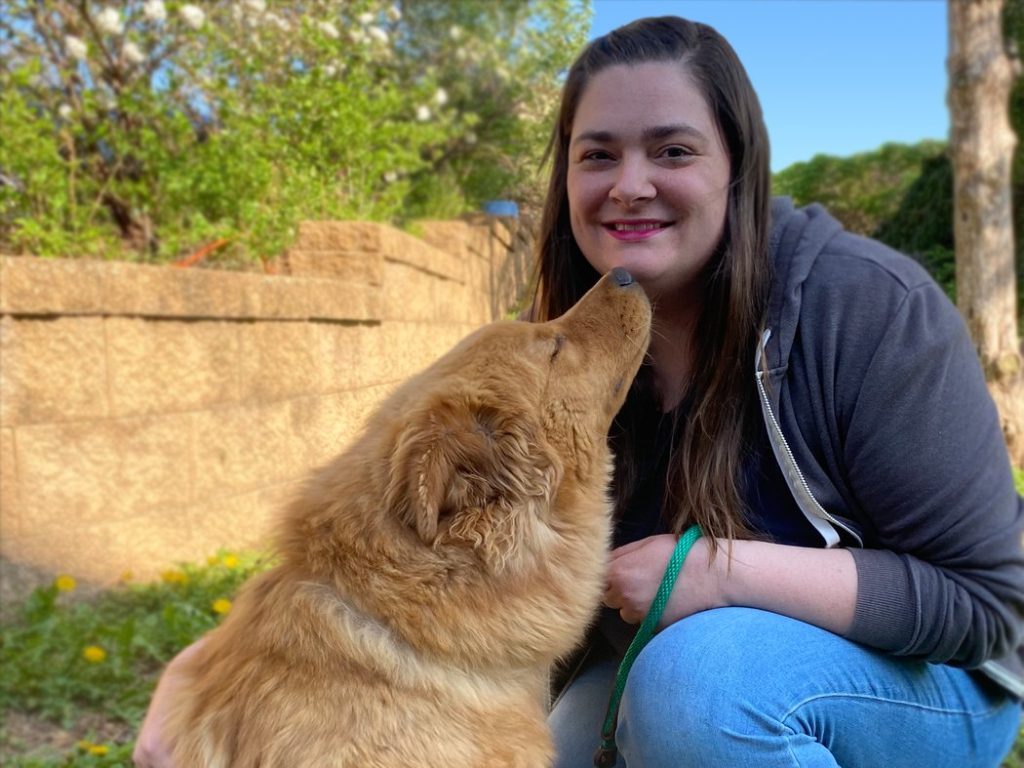
Animal expert, Ashley Flores, CPDT-KA, is the Senior Director of Animal Behavior, Foster & Rescue. Ashley studied under the Council of Certified Professional Pet Dog Trainers (CCPDT), is CPDT-KA certified and American Kennel Club Canine Good Citizen (CGC) certified. She also earned certification for Behavior Pharmacology and Separation Anxiety through Heartland Positive Dog Training Alliance (HPDTA) Training. Email askashley@greatplainsspca.org for a chance to have your pet question answered in KC Parent Magazine.
Shy Pittie Struggles To Meet New People
Olive is an almost three-year-old pit mix. We have had her for about 18 months. She is loving, affectionate and wicked smart. Her circle of trust is small but strong. She is great with other dogs, but strange people are a problem for her, especially men and tall women. I’m looking for suggestions for how to build her confidence around strangers. Her typical behavior with strangers is barking and then hiding. Sometimes she retreats to her crate and won’t come out until strangers leave the house. Thanks for any advice you can offer. We would love her to be more relaxed in these situations. – Jacquie Gering
It sounds like Olive is shy and fearful of new people and needs additional time to acclimate to them. My advice is to be patient and ask others to completely ignore her until she is ready to engage with them. Have them avoid direct eye contact and forced engagement, like petting, when she is not ready. At the shelter we use the slow and low method of meeting shy and fearful dogs by squatting on the ground to make ourselves look smaller, no fast movements and lots of patience. If they don’t want to interact, it’s okay. Ignore them and give them attention when they are ready for it. When they are ready, have the person go slow and pet under the chin and not on top of their head. If Olive starts to cower, bark, lunge, yawn, or growl, then she has mild to significant anxiety, and you should take it slower. For extreme cases, I recommend having an Animal Behaviorist work with you on behavior modification. – Ashley Flores, CPDT-KA
Itchy Beagle Needs Help With Allergies
My older beagle scratches, not constantly, but often. Our vet suggested Benadryl, but it’s a battle to get her to take any pill. Is there any home remedy I can try? By the way, our other beagle, who was one of the 4,000 dogs rescued from the Envigo breeding facility and adopted from Great Plains SPCA, is doing well after almost a year with us. – Jim Autry
Thank you for adopting from Great Plains SPCA! I consulted one of our vets for this question and Dr. Dickerson said there are medicated and hypoallergenic shampoos that you can purchase over the counter to see if they could help with her scratching. If those don’t work, there is an injectable option that you should be able to access through your vet if you’re unable to give her pills. For extreme allergies, you can get an allergy test done on your dog to find out exactly what her allergies are. – Ashley Flores, CPDT-KA and Dr. Dickerson, DVM
Potty Training A Bernadoodle Puppy In An Apartment
I have a three-and-a-half-month-old Bernadoodle puppy. We live in an apartment and I am curious about the best way to potty train her. Thanks so much! – Shelley
I am a big fan of crate training and positive reinforcement, so I recommend purchasing a crate, training her to use the crate for when you aren’t able to supervise her, and rewarding her when she goes to the bathroom outside. Make sure you feed her at the same time every day to get her on a schedule so that you can predict when she will have to go. I like to pick one spot for potty breaks outside so dogs can associate that area with eliminating instead of outside play. Taking the puppy outside every one to two hours and rewarding her every time she goes potty will create good habits. I do not recommend scolding her in the home when she has an accident, as that can set her back. Some people will rub a dog’s nose in the carpet after they have urinated. Dog trainers have found that method to be ineffective and cause delays in potty training. It creates confusion because they don’t realize they are in trouble for having an accident in the home, and associate it with the act of urinating, so puppies will start to hide when going to the bathroom. – Ashley Flores, CPDT-KA
Email askashley@greatplainsspca.org for a chance to have your pet question answered in KC Parent Magazine! For anyone interested in a Behavior Class or Consulation, our expert Behavior Team can work with you to help resolve any behavioral challenges you are experiencing with your pet. CLICK HERE for more information and registration.

